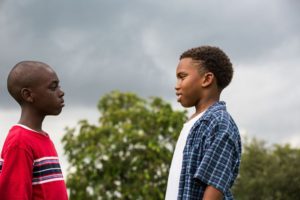Moonlight
 Writer-director Barry Jenkins has adapted Tarell Alvin McCraney’s play “In Moonlight Black Boys Look Blue” for the big screen, and the result is one of the year’s greatest films, and perhaps the best African-American coming-of-age story since John Singleton’s Boyz n the Hood clear back in 1991. Moonlight tells the story of young Chiron (called “Little” by his friends) and how he handles bullying, drugs, sexuality, and a disjointed home life.
Writer-director Barry Jenkins has adapted Tarell Alvin McCraney’s play “In Moonlight Black Boys Look Blue” for the big screen, and the result is one of the year’s greatest films, and perhaps the best African-American coming-of-age story since John Singleton’s Boyz n the Hood clear back in 1991. Moonlight tells the story of young Chiron (called “Little” by his friends) and how he handles bullying, drugs, sexuality, and a disjointed home life.
As a youth in New York, Chiron is bullied by classmates and, seeking refuge in a tenement, is found by Juan (Mahershala Ali), a Cuban immigrant who takes Chiron under his wing and mentors him through some of the difficult periods of his childhood. Juan teaches Chiron how to swim in the ocean, and he and his girlfriend Teresa (singer Janelle Monae) feed Chiron and even allow him to spend the night. Unfortunately, Chiron’s mother Paula (Naomie Harris) is a crack addict; in a plot twist designed to leave a lifelong impression on Chiron, Juan turns out to be Paula’s supplier.
As a high schooler, Chiron deals with more severe bullying and with his mother’s burgeoning drug dependence. He begins to explore physical urges with his lifelong friend Kevin – a sexually active teen who appears to be bisexual. Kevin has always felt sorry for Chiron, and the two boys are able to open up to each other in ways they might not with their other classmates.
As an adult, Chiron – now living in Atlanta, where is mother is in a rehab facility – receives a call out of the blue from Kevin, who asks Chiron to drive up and eat at his new diner. Kevin is the owner and cook. The two reminisce and catch up, in what amounts to one of the most somber and meaningful codas of any film this year.
Moonlight is a mesmerizing tale of growing up poor, growing up black, and (possibly) growing up gay. There’s a lot of material here, and it’s one you’ll want to see again.
However (and you knew there was going to be a “however,” didn’t you?), I have two issues with Moonlight. First, Chiron and Kevin are played by three different actors (child, teen, and adult). All the actors look similar, but in the case of Kevin, perhaps not similar enough. It’s easy to follow Chiron’s progression; he’s the protagonist, and the camera tends to focus on his face during transitions in time. But Kevin is a little harder to follow. With all the street names, it took me a while to even know that the boy’s name was Kevin in the first place. Then (as a supporting character), following his maturity becomes a little burdensome when we’re trying to focus on Chiron. I realize not every director films the same actors from childhood to adulthood the way Richard Linklater did with 2014’s Boyhood, but the aging of characters should be a little easier to discern.
My other problem with Moonlight is something that Jenkins could not help, as he adapted his screenplay directly from another medium. And that is the character of Juan. Around the period when Chiron is a teenager, Teresa informs him that Juan has died, but that he’s still welcome to stay at her house. I would loved to have seen the relationship between Juan and Chiron blossom as Chiron matures – rather than to keep Juan as a confidant of his childhood only. To me, theirs is the most interesting relationship in the entire picture, and I’d prefer the screenplay keep its focus there rather than between Chiron and Kevin.
Having stated my preference, I still believe what makes it to the screen is borderline brilliant, and very refreshing in the sense that this is a story about the development of a particular person rather than an indictment of ghetto street life. Spike Lee has more than adequately covered that territory in numerous films, and I was afraid Moonlight would follow course. It does not. In fact, while we might assume that Juan has been killed (given his “career”), we never see the death. Indeed, we never see any gunplay or firearms at all. That’s not to say there isn’t some violence (during the high school bullying scenes), but I have a feeling Moonlight isn’t going to be what some might expect.
Moonlight almost plays out like a companion piece to Boyhood, in that both are stories of boys growing up and coming of age. While Mason, the central character of Boyhood is forced to deal with an entirely different set of circumstances during his formative years, both pictures empathize with their subjects while laying bare the inherent difficulties of youth. Moonlight isn’t quite in the same league as Boyhood, but it’s one of 2016’s tremendous achievements in filmmaking.
Andy Ray’s reviews also appear on http://www.currentnightandday.com/
and he serves as a film historian for http://www.thefilmyap.com/